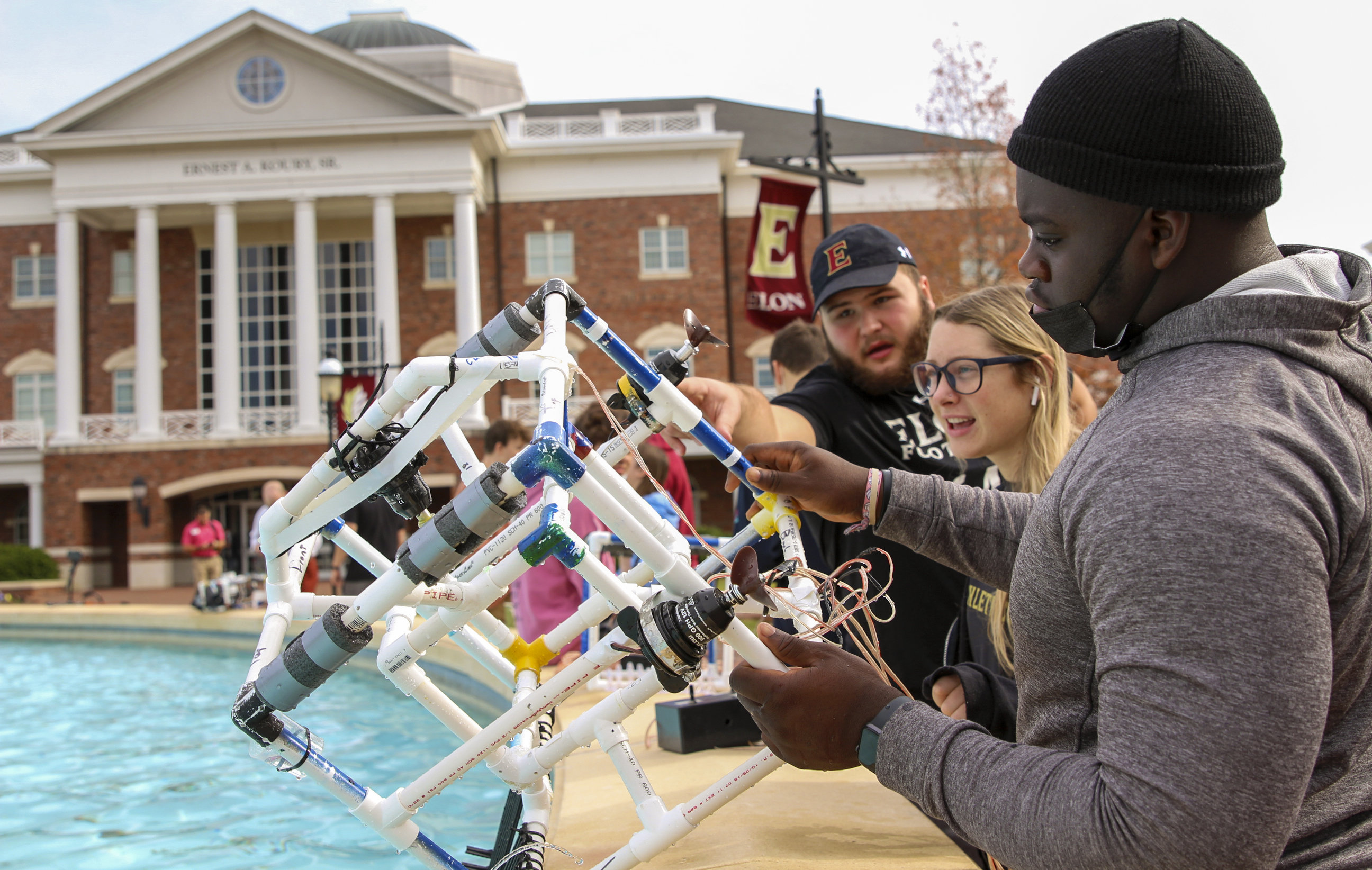Formation of the Department of Engineering comes after years of planned growth and as the university prepares to open the Innovation Quad's first two buildings.
Reflecting years of growth in the program and marking a milestone in the Boldly Elon strategic plan, Elon University established the Department of Engineering on Aug. 1.
The formation coincides with the opening of the first two buildings in Elon’s Innovation Quad, a state-of-the-art center for engineering and physics research and cross-disciplinary collaboration featuring 60,000-square-feet of cutting-edge lab and prototyping spaces.
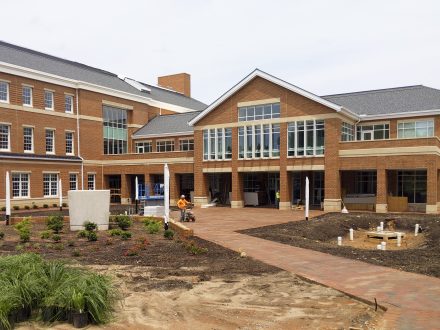
Associate Professor Scott Wolter will serve as the department’s first chair. After years of strategic growth in enrollment, curricula, and programming, as well as significant attention by university leadership to advancing excellence in Elon’s STEM programs, the department is primed to flourish, Wolter said.
“We want to be a nationally recognized small engineering school,” Wolter said, echoing an objective of the Boldly Elon plan. “Our goal is to graduate around 100 students in each class with a solid academic foundation and strong engineering skills. We anticipate that enrollment will continue to grow in the near future to meet this target. With the excitement of the new learning spaces and spaces dedicated to collaboration, our program is poised to provide the type of innovative engineering education to meet the challenges of the 21st century.”
The transition to a department comes as the program expands to offer additional courses and degree concentrations, made possible by faculty expertise and the cutting-edge facilities of the Innovation Quad.
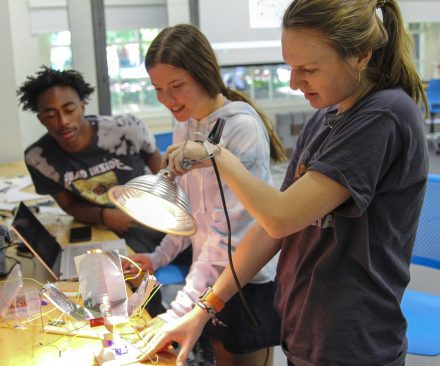
Elon’s engineering program has been part of the Department of Physics since 1999, when the university partnered with N.C. State University to offer a dual-degree engineering program. That program grew to count nine partner institutions, currently including NCSU, Georgia Tech, Clemson University, Penn State and the University of Notre Dame.
Evolving a distinctive brand of hands-on and project-based learning infused with liberal arts perspectives, Elon launched its own four-year Bachelor of Science in Engineering major in 2018. Enrollment has steadily grown since. It graduated the first three students in 2020. In 2022, eleven graduated with the degree. This fall, 48 incoming first-year students will join the program for a total of 123 students in the four-year and dual-degree tracks.
That growth indicates the unique strengths of Elon engineering, said Gabie Smith, dean of Elon College, the College of Arts and Sciences.
“Elon’s engineering curriculum is truly innovative, providing a rigorous preparation in engineering skills within the rich context of a liberal arts education,” Smith said. “Our undergraduates develop the technical prowess, broad critical thinking and collaborative dexterity needed to solve complex problems and thrive in the field.”
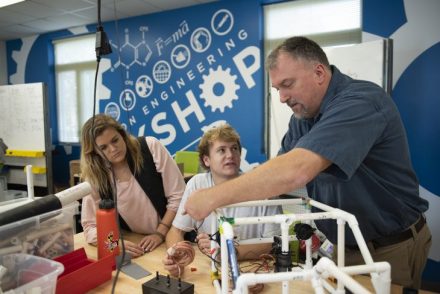
In addition to the general engineering B.S., students can concentrate in biomedical engineering, computer science, and — beginning this fall — environmental engineering. Several engineering minors are also in development. This fall, the interdisciplinary Engineering Design Minor will begin enrolling students in a curriculum that equips non-engineering majors with foundational engineering skills applicable to a broad range of disciplines.
Associate Professor Sirena Hargrove-Leak joined Elon in 2004 as the program’s second faculty member with Associate Professor Emeritus Rich D’Amato. She coordinated the four-year degree through this spring. She and Wolter stressed the shared mission of continuous improvement in the program by faculty and staff.
“We’ve expanded in terms of the breadth of options for our students, as well as the depth of our curriculum. We are always working to strengthen our courses,” Hargrove-Leak said. “In 2004, we couldn’t envision a school of engineering, but the program has been improving, progressing and growing continuously, so now it is clear that it is possible.
“One of the most beautiful things about that is that the gains engineering is experiencing aren’t isolated to the program. They extend to the entire university community. We expect to attract different kinds of students and I’m excited that everyone stands to benefit,” she added.
Among strategic milestones in the last few years, Elon’s engineering program:
- Completed Accreditation Board for Engineering and Technology’s (ABET) rigorous accreditation process from 2019 to 2022, and a formal announcement of accreditation is expected this fall. ABET accreditation signifies a program’s success in graduating engineers prepared to meet the needs of global employers.
- Added new faculty and staff, including Associate Professor Bethany Brinkman, Assistant Professor Will Pluer, Lab Manager Matthew Banks and Director of Engineering Outreach John Ring.
- Convened the Engineering Advisory Board, which consists of industry professionals across the country, alumni and parents helping guide the program to excellence.
- Established the Engineering Scholars program, enrolling up to 20 talented and engaged budding engineers into the program each year. Twenty scholars will enroll in fall 2022.
Wolter is especially proud of the cohesion and shared investment by engineering faculty and staff.
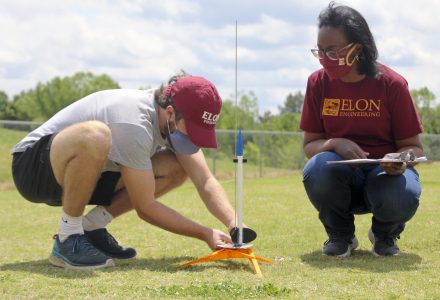
“The culture of our program is very important. We are motivated and excited about the growth of the program, we all enjoy teaching, and we recognize the value in maintaining close relationships to manage the challenges of the pace and growth,” Wolter said. “Elon makes it happen. Our leadership enables great teaching and I think everyone in our STEM programs feels their support.”
In addition to opening the Innovation Quad this fall, the university is also extensively renovating Dalton L. McMichael Sr. Science Center’s laboratories, classrooms and meeting spaces to advance studies in the natural sciences. The first phase of those renovations will be completed this month. A second phase is planned for summer 2023.
“These facilities represent new possibilities for our students,” Hargrove-Leak said. “They will have dedicated spaces to do the types of things that they get so excited about: designing and building. They will also be able to test their creations in a more robust way. This facility is going to be life-changing for them.”



